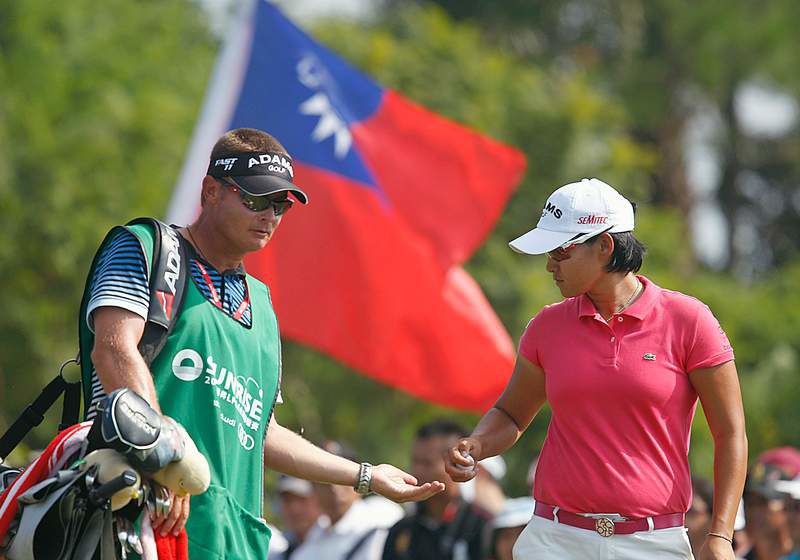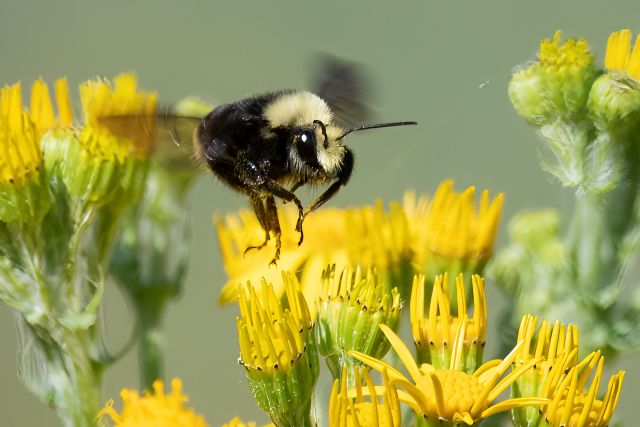A celebrity in Taiwan, unknown in America
Published 4:00 am Thursday, December 8, 2011

- Yani Tseng, of Taiwan, exchanges balls with her caddie in front of a Taiwan national flag during the final round of the LPGA Taiwan golf championship at the Sunrise Golf and Country Club in Taoyuan, Taiwan, in October.
ORLANDO, Fla. — It is the all-American girl’s study as conceived by a Hollywood set director. In addition to her growing collection of trophies, Yani Tseng has displayed two dozen Starbucks mugs from all over the world, an ad for a local pizzeria and a plush Angry Bird scowling from a loving cup. Only the 8 1⁄2-by-11 certificate noting Tseng’s completion of a Level 4 English class hints at her deepest roots.
Tseng, 22, is the world’s No. 1 female golfer, a one-name celebrity in her native Taiwan and the spark of the sport’s next big boom, in her homeland and in China.
She is the youngest golfer, man or woman, to win five major titles. For her next act, Tseng wants to win over America. She may find it easier to become the first woman to win a calendar Grand Slam.
With the exception of superstars like Tiger Woods and Phil Mickelson, golfers are faint stars in the U.S. firmament, outshined by football, basketball and baseball players. For a female golfer to make the rounds of the morning talk shows, all the planets have to align. It happened in September, but the player was not Tseng, who had won eight tournaments by then. It was Lexi Thompson, a tall, blond American teenager fresh off her first professional victory.
Asian invasion
Over the past decade, the LPGA has had a proliferation of South Koreans in its ranks following the success of Se Ri Pak. Since 2008, its overall schedule has been downsized, but the number of tournaments in Asia has been rising. Among the official events added this year was one in Taiwan, which Tseng fittingly won for the 10th of her 11 worldwide titles in 2011.
The crowds that met Tseng at the airport when she arrived for the event were so large, she required the same security detail that accompanied the pop star Lady Gaga when she performed there. It was the same story on the course, where Tseng’s large following led her 92-year-old grandmother to ask if she had paid to have all the people brought in.
“It was so much fun,” Tseng said, adding, “Now I know what Tiger feels.”
After the success of the event, organizers in Taiwan paid handsome appearance fees to lure eight of the top 10 female golfers to New Taipei City this week for what amounts to a curtain call: an 18-hole skins game, followed by the Taiwan Ladies Professional Golf Association Invitational.
Tseng’s fame in Asia dwarfs her profile in the U.S., which raises the question: In an increasingly globalized world, does it matter if the brightest stars shine in the East or West? Robert Thompson, a professor of mass media and popular culture at Syracuse, said, “We have this prejudice that it does not matter if you’re huge anywhere else, that the only real sign of success is if you’re famous in the United States.”
He added: “If I were advising her, I don’t think I’d put being famous in the United States at the top of my list. When you’re really famous in Asia, there are billions who know you, compared to millions in the U.S. I’d tell her to keep playing the way she’s playing and if she doesn’t make the highlights on ESPN, oh well.”
Lots of offers
Last year, a Chinese company, looking ahead to 2016, when golf becomes an Olympic sport, reportedly offered Tseng millions of dollars, the use of a private jet and an apartment in Beijing to change her nationality so she could represent the mainland.
“I didn’t think too much about that,” Tseng said. “I’m just very proud to represent Chinese everywhere.”
At a tournament in China last month, Tseng was asked about playing against men, as her mentor Annika Sorenstam once did in a PGA Tour event. She said if the opportunity presented itself, she would like to try it. Within days, a tournament director in Puerto Rico offered her a sponsor exemption to his 2012 event.
“It was really nice to have people who really pay attention to you,” said Tseng, who declined the invitation. “I feel like every word I say now, I can really inspire people.”
Tseng may be on the vanguard of a new world order, but as long as Madison Avenue is in New York, she will polish her English, wiggle into form-fitting outfits and do her best to woo U.S. advertisers.
“We know Yani has a couple of strikes against her in America,” Tseng’s adviser, Ernie Huang, said. “One, she is a woman, and second, she is Asian. It does not diminish her desire to be a sports icon, and in order to accomplish that, she still needs to embrace Western society.
“We have been pretty patient. We don’t care how long it takes. We’re like that old Smith Barney commercial. We want to make money the old-fashioned way. We want to earn it.”
What is she like?
Tseng is often compared to Soren- stam, a former No. 1 player with a powerful game. Temperamentally, she is more like Shaquille O’Neal, the playful former NBA superstar.
Like O’Neal, who invited reporters to his retirement party, Tseng opened her Orlando home to members of the golf media before the first round of the season-ending CME Group Titleholders last month at Grand Cypress Resort, a 30-minute commute from the gated community where she lives. Her caddie, Jason Hamilton, grilled steaks, and his fiancee, Katy Mullin, made appetizers.
Dressed like Harry Potter in a black cape and black-rimmed glasses, Tseng delivered a welcome speech to her guests. That would have been unimaginable four years ago, when Tseng’s command of English was so poor, she was reluctant to speak.
At 18, Tseng moved with her mother to the Southern California desert town of Beaumont to work on her game. She had announced herself three years earlier with a victory over Michelle Wie in the final of the 2004 U.S. Women’s Amateur Public Links.
Tseng turned pro in 2007 and earned her LPGA playing privileges for the 2008 season, when she won her first major, at the LPGA Championship, and rookie of the year honors. She has won 23 worldwide titles in her career, 12 on the LPGA tour.
Image conscious
On the course, Tseng is a beguiling mix of fire and nice; she walks with her shoulders forward, but her smile takes the edge off her aggression.
She dresses in slacks or shorts, and would sooner hit out of a poison ivy patch than wear a skirt to play. So the photographs of her in the upscale Taiwanese lifestyle magazines scattered throughout her 5,400-square-foot house drew double takes. In one magazine, Tseng kicked up a heel in a green minidress and dark stockings with a leopard-print scarf tied loosely around her neck. Her short hair was moussed and styled, and her face was luminous.
Tseng turned away from that page and thumbed through another magazine. She stopped at a photo layout in which she wore a tailored black suit and a fedora, and leaned forward on a stool.
“This is my favorite,” she said, sounding more bashful than boastful.
The former LPGA player Val Skinner, now a Golf Channel analyst who has walked countless rounds alongside Tseng, said: “She’s always had an openness and a vulnerability about her. There’s a humility in her that’s different than what people might expect.”
Playing pool in her recreational room, Tseng strutted after her shots the same way she does after hitting a putt on a perfect line. Then, after collecting $20 from her vanquished opponent, she tried to give the money back.
Tseng’s older brother, Hung-Wei, had just arrived for a visit. Tseng followed their father, a recreational golfer, on to the course, but her brother briefly raced motorcycles professionally. “He had more sponsors than me,” she said.
Standard bearer
She was kidding. Tseng is the Arnold Palmer of women’s golf, increasing the sport’s visibility with her genial nature and go-for-broke playing style.
“The young golfers are increasing because of Yani,” Julie Wang, a Taiwanese journalist, said by email. “And China, golf is popular there, so lots of Chinese fans are proud of Yani. She is a hero in our era.”
Tseng drew more fans at the LPGA Taiwan Championship in October than Woods did at the 1999 Johnnie Walker Classic in Taiwan.
“We had 60,000 people in four days come, 20,000 fans in the final round,” Wang said. “We never had a sight like that before.”
Wang, who has written a biography of Tseng, said Tseng last year was voted the fourth most influential figure in Taiwan in a television poll behind the president, the chairman of the Democratic Progressive Party and the electronics tycoon Tai-Ming Gou.
Taiwan has had other star athletes: pitcher Chien-Ming Wang, who played last season for the Washington Nationals; Chi Cheng, the 1968 Olympic bronze medalist in the women’s 80-meter hurdles; Liang-Huan Lu, the 1971 British Open runner-up; and the golfer T.C. Chen, who led after the first three rounds of the 1985 U.S. Open before finishing second.
“Those stars are old now, we need new blood,” Julie Wang wrote.






